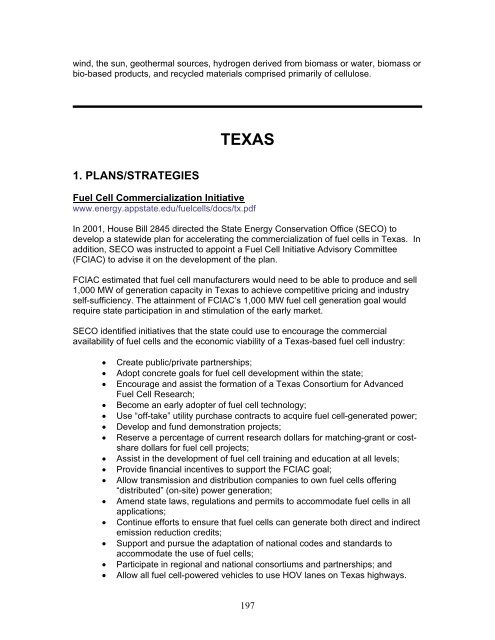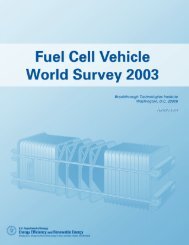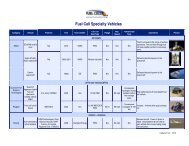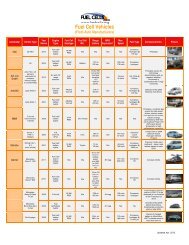Breakthrough Technologies Institute - Fuel Cells 2000
Breakthrough Technologies Institute - Fuel Cells 2000
Breakthrough Technologies Institute - Fuel Cells 2000
Create successful ePaper yourself
Turn your PDF publications into a flip-book with our unique Google optimized e-Paper software.
wind, the sun, geothermal sources, hydrogen derived from biomass or water, biomass or<br />
bio-based products, and recycled materials comprised primarily of cellulose.<br />
1. PLANS/STRATEGIES<br />
TEXAS<br />
<strong>Fuel</strong> Cell Commercialization Initiative<br />
www.energy.appstate.edu/fuelcells/docs/tx.pdf<br />
In 2001, House Bill 2845 directed the State Energy Conservation Office (SECO) to<br />
develop a statewide plan for accelerating the commercialization of fuel cells in Texas. In<br />
addition, SECO was instructed to appoint a <strong>Fuel</strong> Cell Initiative Advisory Committee<br />
(FCIAC) to advise it on the development of the plan.<br />
FCIAC estimated that fuel cell manufacturers would need to be able to produce and sell<br />
1,000 MW of generation capacity in Texas to achieve competitive pricing and industry<br />
self-sufficiency. The attainment of FCIAC’s 1,000 MW fuel cell generation goal would<br />
require state participation in and stimulation of the early market.<br />
SECO identified initiatives that the state could use to encourage the commercial<br />
availability of fuel cells and the economic viability of a Texas-based fuel cell industry:<br />
• Create public/private partnerships;<br />
• Adopt concrete goals for fuel cell development within the state;<br />
• Encourage and assist the formation of a Texas Consortium for Advanced<br />
<strong>Fuel</strong> Cell Research;<br />
• Become an early adopter of fuel cell technology;<br />
• Use “off-take” utility purchase contracts to acquire fuel cell-generated power;<br />
• Develop and fund demonstration projects;<br />
• Reserve a percentage of current research dollars for matching-grant or costshare<br />
dollars for fuel cell projects;<br />
• Assist in the development of fuel cell training and education at all levels;<br />
• Provide financial incentives to support the FCIAC goal;<br />
• Allow transmission and distribution companies to own fuel cells offering<br />
“distributed” (on-site) power generation;<br />
• Amend state laws, regulations and permits to accommodate fuel cells in all<br />
applications;<br />
• Continue efforts to ensure that fuel cells can generate both direct and indirect<br />
emission reduction credits;<br />
• Support and pursue the adaptation of national codes and standards to<br />
accommodate the use of fuel cells;<br />
• Participate in regional and national consortiums and partnerships; and<br />
• Allow all fuel cell-powered vehicles to use HOV lanes on Texas highways.<br />
197






